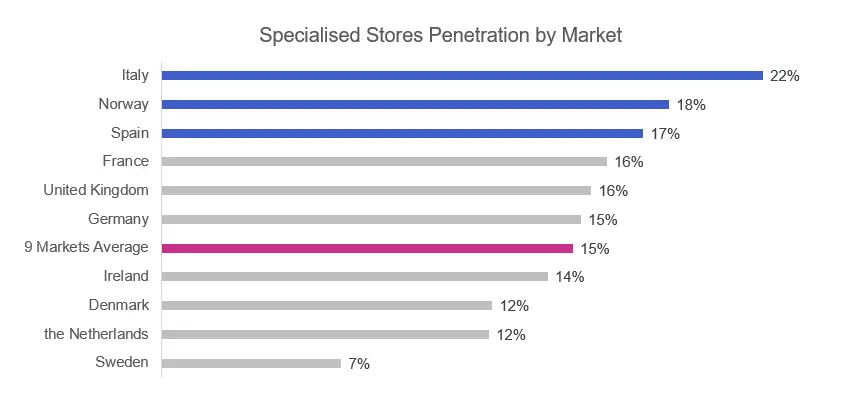Da nicchia a necessità: perché i retailer specializzati stanno crescendo in Europa
Qual è la novità più importante nel retail oggi? Il dominio dei discount? Le pressioni geopolitiche e l’inflazione? A questa lista possiamo ora aggiungere un nuovo protagonista che i retailer tradizionali non possono più permettersi di ignorare.
I retailer specializzati. Un tempo considerati attori di nicchia per consumatori attenti alla salute, all’etica o alla praticità, oggi stanno conquistando il centro della scena. Come dimostra l’ultima ricerca Consumer Pulse di dunnhumby, stanno ridefinendo il modo in cui i consumatori percepiscono il valore, la fedeltà e la fiducia.
Un segnale d’allarme che arriva dalla periferia
I retailer specializzati non sono più ai margini del mercato. La loro proposta, profonda, mirata e orientata a uno scopo preciso, sta dando risultati concreti. Secondo i più recenti risultati del Consumer Pulse, le visite ai negozi specializzati in Europa sono più che quadruplicate dall’autunno 2023. Nello stesso periodo, il traffico nei supermercati, ipermercati e discount è rimasto stabile.
Per i retailer tradizionali, questo rappresenta un rischio chiaro: la possibile perdita di categorie ad alto margine e di specifiche missioni di acquisto (in particolare legate a salute, sostenibilità, cura di sé e qualità). Queste aree si stanno sempre più spostando verso formati più agili e specializzati.
Non si tratta di tendenze isolate, ma di un cambiamento strutturale nel modo in cui i consumatori concepiscono le loro missioni di acquisto e scelgono le insegne a cui affidarsi per soddisfarle.
Perché e dove i retailer specializzati stanno avendo successo
L’ascesa dei retailer specializzati non è casuale, ma riflette cambiamenti profondi nei comportamenti dei consumatori in tutta Europa. La penetrazione di questi formati è particolarmente elevata in Italia, Norvegia e Spagna, mentre in Francia si evidenzia un forte potenziale di crescita.
Nell’Europa post-inflazione, i consumatori stanno ridefinendo il concetto di valore. Non si tratta più soltanto del prezzo a scaffale, ma sempre più spesso, il valore viene interpretato in termini di significato. Ingredienti biologici, filiere locali, produzione etica, credenziali di salute verificate, sostenibilità, freschezza ed etica sono i nuovi elementi competitivi nel grocery. Ed è proprio qui che i retailer specializzati eccellono.
Come emerge chiaramente dai dati del Pulse, questo è particolarmente evidente in mercati come la Francia e la Spagna, dove la connessione emotiva con i retailer è in aumento, a vantaggio dei formati specializzati che registrano performance in netto miglioramento.

Uno sguardo più approfondito: i formati vincenti
Il retail specializzato non è un modello unico, bensì un insieme dinamico e diversificato di formati che rispondono a bisogni specifici e consapevoli dei consumatori. In tutta Europa, alcune categorie spiccano per la loro capacità di attrarre traffico e generare crescita:
- Salute e bellezza: farmacie e negozi per il benessere stanno ampliando le loro gamme quotidiane per incentivare acquisti più frequenti.
- Biologico ed etico: retailer come Biocoop, Naturalia e La Vie Claire in Francia, così come i negozi biologici specializzati in Italia, continuano a guadagnare quote di mercato grazie alla crescente domanda di alternative più sane e sostenibili.
- Surgelati: marchi come Picard dimostrano come i surgelati premium possano coniugare qualità e praticità.
- Pet care: pur essendo meno diffusi, anche questi retailer stanno crescendo grazie a consumatori sempre più attenti e orientati a missioni specifiche.
Il trend è chiaro: i retailer orientati alla missione stanno ampliando le gamme, investendo nella notorietà del brand e aumentando la frequenza delle visite.
In Italia, in particolare, i retailer specializzati nei surgelati e nel biologico stanno intensificando gli sforzi per migliorare la brand awareness e raggiungere un pubblico più ampio, entrando in competizione diretta con gli attori tradizionali. Esselunga rappresenta un caso emblematico di successo. Considerata un ibrido tra un’insegna tradizionale e un retailer specializzato, eccelle per l’esperienza in negozio, la fedeltà dei clienti, l’assortimento di marca privata e l’ampiezza dell’offerta.
I retailer specializzati creano legami emotivi più profondi
Se i retailer generalisti hanno storicamente fatto leva su scala e assortimento per generare fedeltà, i retailer specializzati stanno conquistando il cuore e il portafoglio dei consumatori creando connessioni emotive più profonde.
In Francia e Spagna, i consumatori dichiarano livelli più alti di soddisfazione e sintonia emotiva con i retailer specializzati, in particolare quelli con una missione chiara e ben comunicata. Qui l’attenzione si sposta dal prodotto alla fiducia, ai valori condivisi e a un legame più profondo con lo stile di vita dei clienti.
Cosa possono imparare i retailer tradizionali
Non si tratta di una rivoluzione. I retailer generalisti non devono stravolgere i propri modelli di business per trasformarsi in specialisti. Tuttavia, devono attrezzarsi per competere e questo richiede alcuni adeguamenti. Ecco tre azioni da intraprendere:
- Riconquistare le missioni d’acquisto chiave
Scelte più salutari, approvvigionamento sostenibile, benessere personale: questi sono i temi che guidano oggi la spesa. I retailer devono rispondere a queste esigenze non solo attraverso l’assortimento, ma anche con una proposta chiara e significativa.
- Dare più significato all’assortimento
La varietà non si misura più solo in termini quantitativi. I consumatori cercano alternative che riflettano il loro stile di vita, i loro valori e le loro aspirazioni. Gli assortimenti vanno curati per rispondere a queste aspettative.
- Usare la loyalty in modo più intelligente
I programmi fedeltà devono evolversi oltre lo sconto e l transazione. I retailer specializzati i maggior successo stanno creando legami emotivi e non si limitano a raccogliere dati. Per i retailer tradizionali, questo significa progettare programmi fedeltà che premino l’allineamento valoriale, la relazione e lo scopo condiviso, non solo la spesa.
Il messaggio è chiaro: l’ascesa dei retailer specializzati non è una moda passeggera. È un’evoluzione strutturale che cambia profondamente il modo, il luogo e le motivazioni con cui i consumatori interagiscono con il mondo del grocery.
TOPICS
RELATED PRODUCTS
Explore how AI-powered loyalty programmes enhance customer experiences and drive sales with dunnhumby’s personalised, data-driven solutions.
Start Your Loyalty & Personalisation ConsultationCreate customer-centric ranges using AI-powered science
Get a Personalised Assortment PlanThe latest insights from our experts around the world



